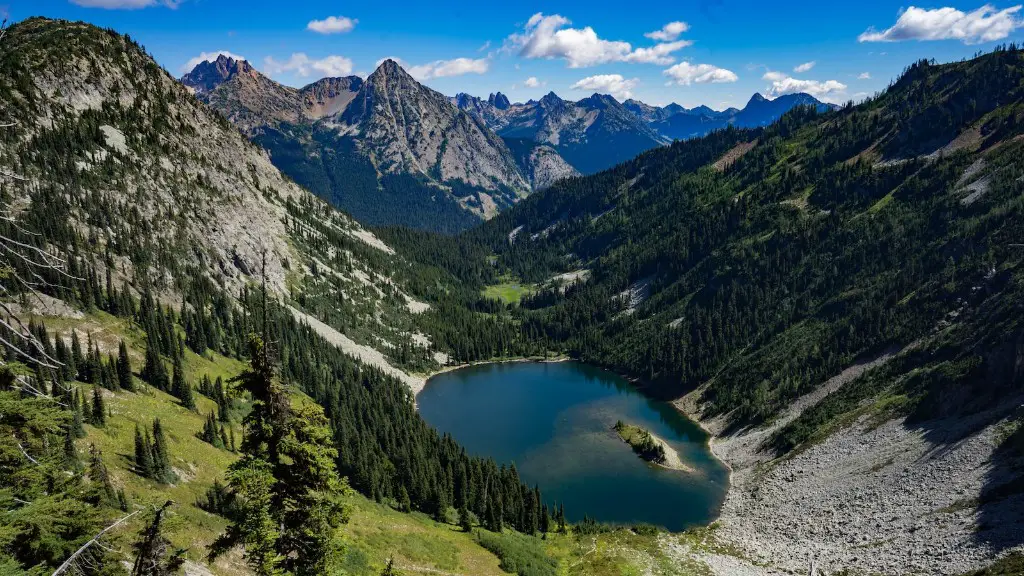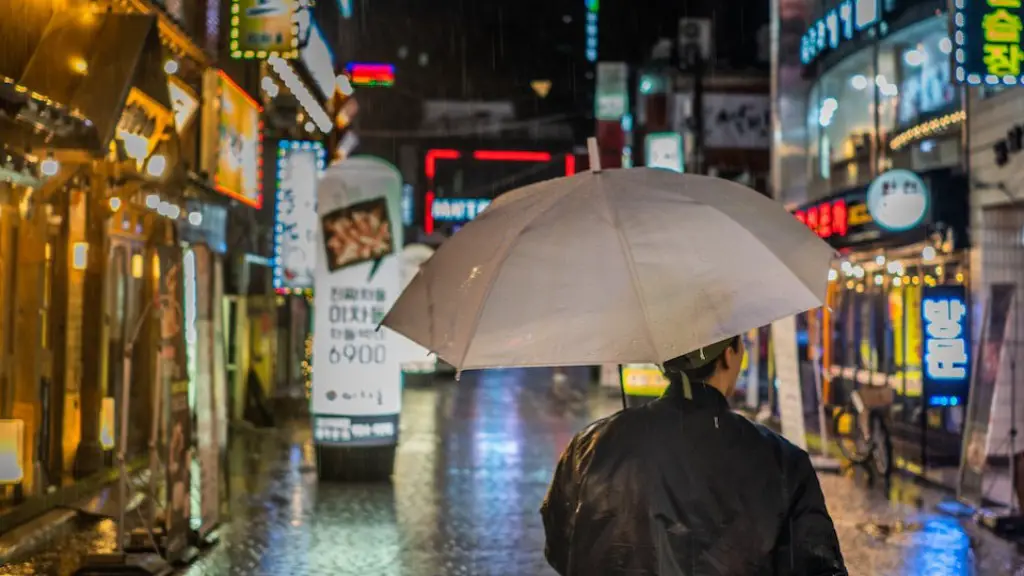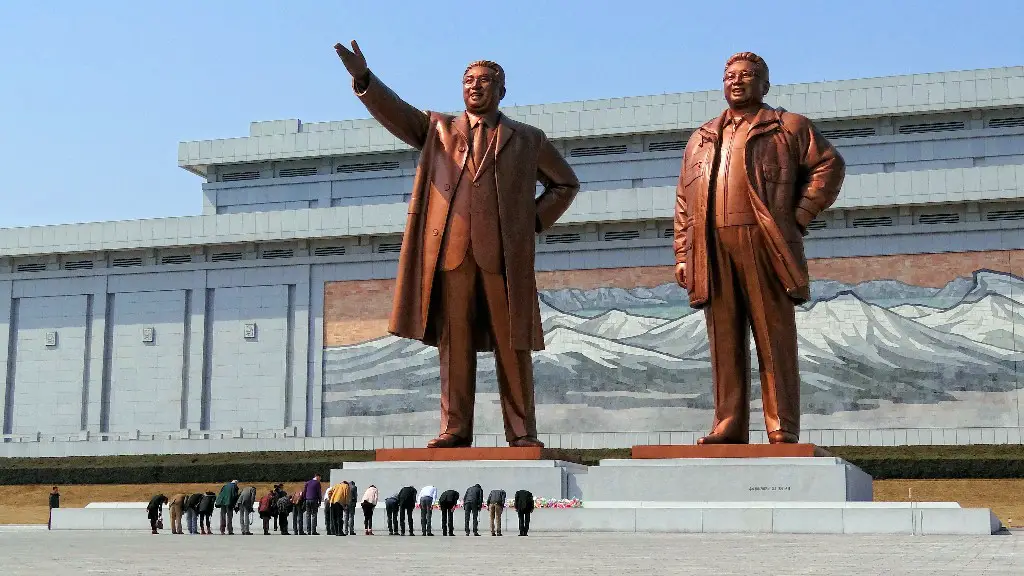Central Leadership
North Korea is a closed society ruled by the Kim dynastic family and the Workers’ Party of Korea. Kim Il-sung, the founder of North Korea, officially serves as the country’s eternal president. His son Kim Jong-il succeeded him as the leader and his successor Kim Jong-un is currently the Supreme Leader. Kim Il-sung was the leader of North Korea from 1945 until his death in 1994, although he held onto power from 1948 until his death. His son Kim Jong-il was made Supreme leader in 1997 and held onto power until his death in 2011, when Kim Jong-un became the third leader of the Kim dynastic family.
The Workers’ Party of Korea, which holds its annual meeting in April, exercises a great deal of control over the government and economic policies of the country. It is chaired by Kim Jong-un and includes members of the Central Committee and the Politburo. The Central Committee is the highest decision-making body of the Workers’ Party of Korea. It sets policies, carries out its decisions and oversees the implementation of the party’s objectives. The Politburo is made up of several dozen members and has the most power over the Workers’ Party of Korea and therefore the country as well.
National Assembly
The North Korean Parliament known as the Supreme People’s Assembly is elected by popular vote every five years to serve as the ruling body of the state. The Supreme People’s Assembly is responsible for enacting, amending and annulling state laws and ratifying international treaties. The Parliament also elects the President of North Korea, who serves as the head of state. The current President is Kim Jong-un.
The Supreme People’s Assembly is made up of 687 representatives elected by popular vote. The representatives are elected on the basis of universal suffrage and secret ballot. The Supreme People’s Assembly meets in ordinary session once a year and in extraordinary session when the need arises. The parliament is also responsible for selecting members of the State Security Council and the National Defense Commission.
Local Government
Local governance in North Korea is based on the decisions of provincial and county-level People’s assemblies. The assemblies are elected by local citizens and serve as the primary governing body for each local area. Each province and county is overseen by a local government which is responsible for managing economic, social and cultural matters. Local government also has the power to make decisions on education, healthcare and other related matters.
The local governments also have an important role in upholding national policies and protecting the interests of the national government. The heads of each local government body are selected by the Central Committee and are responsible for carrying out the decisions of the State Security Council and the National Defense Commission.
Law and Police Enforcement
The Supreme People’s Assembly is responsible for establishing and amending laws in North Korea. National, provincial and county level People’s committees are also responsible for passing, amending and annulling laws on a local level. Laws are enforced by the Ministry of Public Security and are monitored by the State Security Department, the primary intelligence agency in North Korea.
The police force in North Korea is tasked with enforcing the laws, maintaining the safety and security of citizens and upholding government policies. The police force is divided into criminal, traffic police and security police. All police forces are overseen by the Ministry of Public Security.
Military Leadership
The Ministry of National Defense oversees military policy in North Korea. The Ministry of National Defense is headed by the Minister of National Defense who is appointed by the Supreme Leader. The ministry is responsible for coordinating and controlling all branches of the armed forces.
The Korean People’s Army, the armed forces of North Korea, is the largest branch of the armed forces. The Korean People’s Army is divided into the Ground Forces, Navy, Air Forces, Strategic Rocket and Strategic Forces. The Korean People’s Army is responsible for the defense of North Korea and carries out operations in support of the government’s political objectives.
Civil Society Organizations
North Korea does not have any independent civil society organizations. All the organizations that exist in North Korea are state-controlled or affiliated with the government. These organizations include trade unions, friendly societies, women’s organizations, youth organizations and culture and sports organizations.
These organizations are supervised by the government and are overseen by the Central Committee of the Workers’ Party of Korea. The organizations promote the party’s political objectives and serve to educate the people of North Korea on the party’s ideals.
International Relations
North Korea is a member of the United Nations and the Non-Aligned Movement. North Korea is also a member of the Asia-Pacific Economic Cooperation, Asian Economic Community and the Shanghai Cooperation Organization. The North Korean government also maintains diplomatic relations with other countries and is involved in international aid programs.
North Korea is involved in regional economic and security cooperation initiatives as well as diplomatic negotiations with other countries. The Chinese government plays a key role in mediating and facilitating peace negotiations between North Korea and its neighbors. The United States and other countries also maintain diplomatic relations with North Korea, although the relationship is usually tense.
Censorship
North Korea is renowned for its practice of censorship and its tight control of information. The country restricts the access of citizens to foreign media and closely monitors all forms of media to make sure it is in line with national policies.
The North Korean government has strict laws regarding the dissemination and reception of information related to public topics, politics, and foreign media. Internet access is strictly controlled and limited, and surveillance is common. The country also restricts travel by its citizens, in part to prevent information from reaching the outside world.
Education System
Education in North Korea is overseen by the Ministry of Education. Education is compulsory for all North Korean citizens and includes both basic and higher education. Primary and secondary education is based in the social sciences and is focused on the history and ideology of the Workers’ Party of Korea. Higher education is available at various universities and specialized schools scattered around the country.
The curriculum is closely monitored by the ministry and strictly adheres to the teachings of the party. The education system also promotes self-sufficiency and emphasizes the importance of hard work.
Media Channels
The media in North Korea is strictly controlled by the government to ensure that all information shared is in line with the government’s political objectives. All media channels are managed by the Ministry of Culture and are thus highly censored.
The most commonly used media channels in North Korea are the Korean Central News Agency, the official news agency of the country and the Rodong Sinmun, the official newspaper of the Workers’ Party of Korea. Other media outlets include the Korean Central TV, which broadcasts local and international news, as well as Radio Pyongyang, which broadcasts news and music.
Cultural Representations
North Korean culture is relatively isolated from the outside world and most popular culture is heavily censored. Traditional North Korean music and dance is popular among the local population and often features on the state-run television channels.
North Korean cinema is renowned for its stylized realism and focus on themes of idealism and heroism. Films are approved by the Ministry of Culture and propaganda is a common theme in most of them. Popular Korean films include Juche, a patriotic film about the Korean War and The Flower Girl, a story about a young girl who stands up to the oppressive government.
Sports and Recreation
Sports and recreation play an important role in the lives of the citizens of North Korea and the government promotes sporting activities to promote national pride and unity. The country competes internationally in a variety of sports including weightlifting, shooting, table tennis and football.
North Korea also has several sports clubs including the Dragon Soccer Club and the Pyongyang City Sports Club. The clubs participate in friendly matches around the country and offer training and coaching services to the local population.



